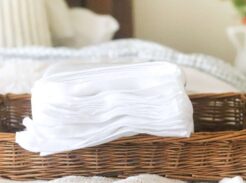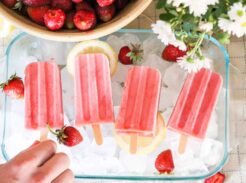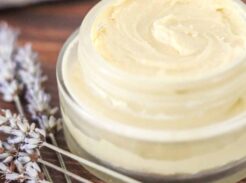Learn to make your own homemade baby shampoo with just a few natural ingredients. Store-bought baby shampoo can contain some pretty scary ingredients, from artificial fragrances to cancer-causing agents. Your baby really doesn’t need a fancy ingredient list when it comes to bath time. This DIY organic baby shampoo recipe is easy and pure for your baby.

Learn how to make your own homemade baby shampoo with just a few natural ingredients. Store-bought baby shampoo can contain some pretty scary ingredients, from artificial fragrances to cancer-causing agents. Your baby really doesn’t need a fancy ingredient list when it comes to bath time. This DIY baby shampoo recipe is easy and pure for your baby.
PIN IT FOR LATER!

Why make DIY organic baby shampoo?
The more I research this topic, the more skeptical I become about our government standards. Now, I’m not an expert on this topic, but the truth is that many ingredients in food and body products that are approved by the FDA are simply not safe for consumption.
Whether it is food or a product you’re putting on baby’s delicate skin, it’s ending up in their body, and I want to make sure I know exactly what’s going in their body.
Just because something is sold on the shelf doesn’t mean it’s safe for you (or your baby).
HARMFUL INGREDIENTS IN TODAY’S WORLD
For example, this article lists 5 American food ingredients that are approved by the FDA but banned in other countries. Most of these are additives, agents, and preservatives used in our food to make it more shelf stable, better tasting, or colored.
Yet, they are banned in other countries. Doesn’t that make you uncomfortable?
Food dyes like red 40 and yellow 6 are perfect examples. Many European countries don’t allow these colorings, yet in the US they are all used in kids’ candies.
And yet we have high rates of child disorders, obesity, heart disease, and many other severe illnesses. Makes me wonder if that would be different if some of these ingredients were banned.
JOHNSON & JOHNSON LAWSUITS
Johnson & Johnson has been under scrutiny for their “baby products” a lot in the last few years. The India National Commission for the Protection of Child Rights (NCPCR) ordered J&J to recall a batch of baby shampoo after it allegedly contained unsafe levels of formaldehyde (source) .
The Company denied this allegation, but it’s still scary none the less.
Currently in the year 2022, there are over 38,000 pending lawsuits (source) against J&J for their talcum powder (baby powder). A product many people consider just your ordinary staple.
In 2020, J&J stopped manufacturing baby powders that contain talc after it was discovered that talc contains asbestos, a cancer-causing agent. As usual, the European Union banned talc-containing products first, but Johnson & Johnson still defends it, although they stopped producing it in the US (source).

This post contains affiliate links, which means I may make a small commission off items you buy at no extra cost to you. As an Amazon associate, I earn on qualifying purchases. See my full disclosure here.
MAKING YOUR OWN PRODUCTS IS EASY
Did you know that owning a few staple ingredients can allow you to make all sorts of products for your home and life? Here are a few staples that we keep on hand and how we use them, not just in our homemade natural baby wash and shampoo but in other personal care products as well:
Essential Oils (with wholesale discount!)

BENEFITS OF CASTILE SOAP
Castile soap is a plant-derived soap that is gentle on the baby’s skin and yet has powerful cleaning properties.
It is made from olive oil, coconut oil, and sunflower oil and is also biodegradable, non-GMO, and nontoxic, so it’s safe to use around pets and babies.
It contains no synthetic preservatives, thickeners, or foaming agents.
Use Castile soap in homemade dish soap, hand soap, body wash, or this case we’re using it for our homemade natural and organic baby shampoo. You can find Castile soap in bulk on Amazon.
This Castile soap is unscented and 3x more concentrated than conventional soap, so it should be diluted.
Any Castile soap you buy will have instructions on how to dilute it, so be on the lookout for that. It is not like conventional soap that you buy from the store and then use it as-is. You always want to dilute Castile soap.
Castile soap is great for homemade baby shampoo but also homemade baby wash. It can be used, diluted, by itself to just wash baby off at the end of the day.

BENEFITS OF VEGETABLE GLYCERIN
This stuff is great. I’ve had mine for 2 years now and I don’t think I’m even halfway through it because you only ever need such a small amount.
Vegetable glycerin is derived from coconut and it often used as a foaming agent in homemade products, such as body wash or shampoo.
It also provides high level of moisturization and hydration, making it an ideal choice for homemade skin and body care. This is also ideal for baby’s head, as it could have cradle cap or just dry skin from all the growing your baby does in the first year!
This vegetable glycerin is 100% organic and sustainably sourced from coconut. It is food-grade, making it safe to use around babies (although it shouldn’t be consumed intentionally, of course).
If you’re not a fan of coconut oil, you can try other oils such as; avocado oil, jojoba oil, or almond oil that are just as good for baby’s delicate skin barrier.

BENEFITS OF ALOE VERA
Aloe vera is one of my favorite ingredients to use on my baby. There is nothing more soothing to baby’s skin than aloe vera. I also use it in my homemade cloth wipes solution.
Aloe vera is a natural wound healer, containing antioxidants and antibacterial properties. It comes from the aloe plant, and when searching for a good aloe vera gel make sure you’re finding one that is 100% plant-derived, not powder-derived.
This aloe vera comes from the aloe plant and is NSF organic and IASC certified. It also contains a natural thickener (seaweed extract), and it absorbs quickly with no sticky residue.
Aloe can be used daily on hair, face, and skin, and can treat sunburns, cuts, bee stings, shaving burn, and more. I like using aloe vera on my baby to help prevent diaper rash and in this natural shampoo recipe to reduce the growth of cradle cap.

USING ESSENTIAL OILS ON BABIES
Essential oils are another staple in our house because they can be very powerful tools for a natural medicine cabinet. You can diffuse them, dilute them for the baby’s delicate skin, or even take some of them internally.
But you do need to be careful, as essential oils are very powerful. We typically only use them for homemade cleaning products (because they do work so well at that!) and I also use them in my homemade body lotion recipe.
For using essential oils on a baby, you want to use a very small amount and always dilute it. And you also want to find the highest quality oils. If you buy oils from the drugstore, they may contain additives and other artificial ingredients – which is the opposite of what you’re trying to do by using the oil in the first place. Only pure for baby, please!
Of course, this is not medical advice. You should ask your baby’s health care provider before using any essential oils on them if you are concerned.
FINDING QUALITY ESSENTIAL OILS
DoTERRA essential oils are free of pesticides and contaminants, based on their Certified Pure Tested Grade standard, so we use those oils in our house.
My research shows that doTERRA’s certification process, which was essentially created by doTERRA since a testing standard did not exist for essential oils previously, means that the oils are very similar to organic. They do not carry that certification though, and this is likely because doTERRA sources oils from various countries which do not have the same certification standard as we do.
If you do shop for oils with doTERRA, be sure to shop wholesale to get the discount. This will save you a lot of money if you’re buying oils for use in home and skin care.
Another good source for high-quality oils is from Ancient Nutrition (or Dr. Axe, if you’ve heard of him). He’s a big name in the natural health community. I have never tried his oils but they are certified USDA organic, so I would buy those if I didn’t have doTERRA.
Price-wise, you may find that some oils are more expensive from doTERRA (especially at full price), and likewise some are more expensive with Ancient Nutrition. It just depends on the oil. In general I’d say doTERRA wholesale prices will be cheaper.

BEST ESSENTIAL OILS FOR BABIES
For babies, you want to use gentle oils, diluted, and always test an area of the skin first. Here’s what I find works best for baby products such as this natural homemade baby wash and shampoo.
Hawaiian Sandalwood Essential Oil Benefits
I love the smell of this oil, it might be my favorite actually! It is often used in meditation for its calming effects, and it’s good at soothing sensitive skin. It is an anti-inflammatory, anti-microbial, and anti-proliferative agent. It’s used for treatment of acne, eczema, warts, and other skin issues (source).
Frankincense Essential Oil Benefits
Frankincense has many properties that are both healing and helpful in promoting healthy skin and overall healthy. It has anti-inflammatory properties and supports the overall immune system. Frankincense even can help aid in the killing of tumor cells, as shown in this study.
Myrrh Essential Oil Benefits
Myrrh can promote healthy skin, is a natural anti-inflammatory, and can aid in wound healing. A study showed treatment with myrrh induced an initial increase in white blood cells that persisted through the post-injury healing period (source).
Lavender Essential Oil Benefits
Lavender is famously known for its calming affect on the body. It can improve sleep and reduce stress simply by diffusing it. Many say that it is good for sensitive skin, but according to PubMed the results are controversial (source). I don’t add lavender to this baby shampoo because I already have it in my homemade baby wipe solution, but it’s what I would add if I was out of one of the other oils.
Note – you can grab these essential oils at the wholesale discount in this shopping cart I put together for this blog post. If you have any questions feel free to reach out to me!
TOOLS NEEDED
Waterproof Label Paper (for making your own baby wash and shampoo label)
Baby Shampoo Labels (a FREE printable as shown above)
HOMEMADE BABY SHAMPOO INGREDIENTS
1/4 cup Castile soap
3/4 cup filtered water (not hard)
1/8 cup vegetable glycerin
1/8 cup aloe vera
2-3 drops each of Hawaiian sandalwood, Frankincense, and Myrrh (optional). Grab them all at a wholesale discount here.
THE PROCESS
Combine all ingredients except water in a foaming shampoo dispenser.
Add filtered water to top
Shake well before using. It’s normal for these natural ingredients to separate. Add a baby shampoo label if desired.
Use 1-2 pumps depending on amount of hair. Note: while this shampoo is gentle, it is not tear-free. Try to avoid baby’s eyes!






Never forget the ingredients. Download the free printable baby shampoo label here!
FAQ
How long does homemade baby shampoo last?
This homemade baby shampoo lasted me about a year with one baby. Of course it depends on how much hair your baby has and how often you wash it.
Can this be used as a body wash?
Yes, this shampoo is also a body wash. There is no need to make a separate body wash for your baby. If you did, it would probably be hte exact same ingredients!
Whenever I bathe Allison, I just squirt this in my hands and rub it in her hair. Then when I’m rinsing it out I also wash down her body. So a little bit goes a long way!
IS HOMEMADE NATURAL BABY SHAMPOO TEAR FREE?
This gentle formula is perfect for babies and kids, but I would not call it tear free. Wash your baby carefully, and and if shampoo gets into eyes, rinse with warm water. The ingredients in conventional “tear free” baby shampoos are not the safest for your baby to have on their skin.
IS IT OK FOR ADULTS TO USE BABY SHAMPOO?
Absolutely! Actually, many adults prefer to use baby shampoo, as it’s gentler on hair and, when you make it yourself, its free of the chemicals found in conventional adult shampoos. If you suffer from dry hair or a dry scalp, you may have really good results with this homemade natural baby shampoo.
AT WHAT AGE SHOULD YOU STOP USING BABY SHAMPOO?
There’s really not a right or wrong time. You can adjust your recipe for your child’s personal haircare needs as they get older, but homemade natural shampoo is something the entire family can use no matter the age.
More Homemade Body Recipes from the Homestead
DIY Natural Stretch Mark Cream
Beginner’s Guide to Using Essential Oils for Body and Home

Homemade Baby Shampoo with Essential Oils
This homemade baby shampoo is gentle and soothing for newborns through toddlers. Made with natural ingredients you may already have at home.
Ingredients
- 1/4 cup Castile soap
- 3/4 cup filtered water (not hard)
- 1/8 cup vegetable glycerin
- 1/8 cup aloe vera
- 2-3 drops each of Hawaiian sandalwood, Frankincense, and Myrrh (optional)
Instructions
- Combine all ingredients except water in a foaming shampoo dispenser.
- Add filtered water to top
- Shake well before using. It's normal for these natural ingredients to separate.
- Use 1-2 pumps depending on amount of hair. Note: while this shampoo is gentle, it is not tear-free. Try to avoid baby's eyes!
PIN IT FOR LATER!




Leave A Comment